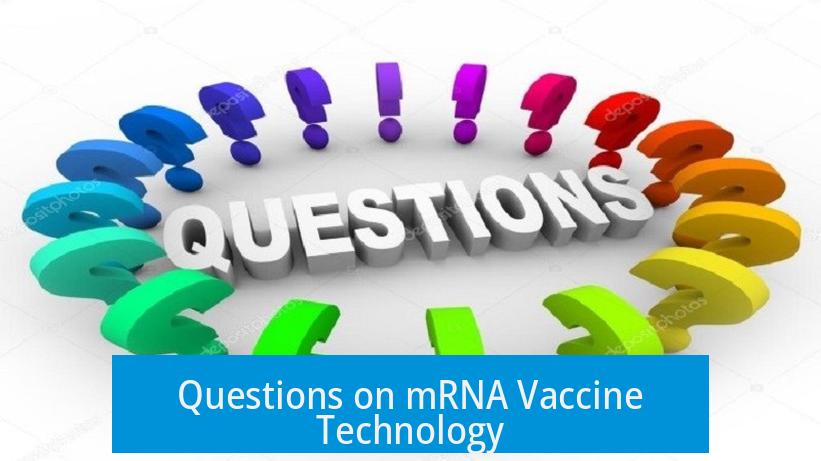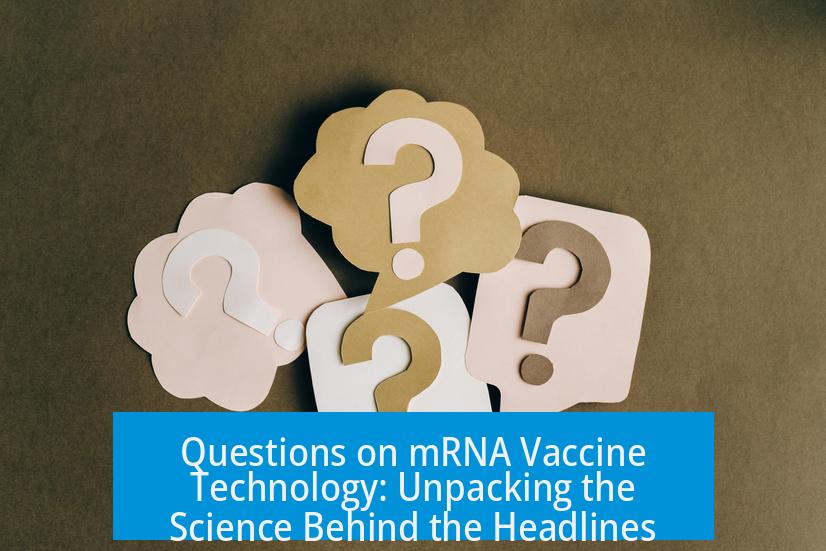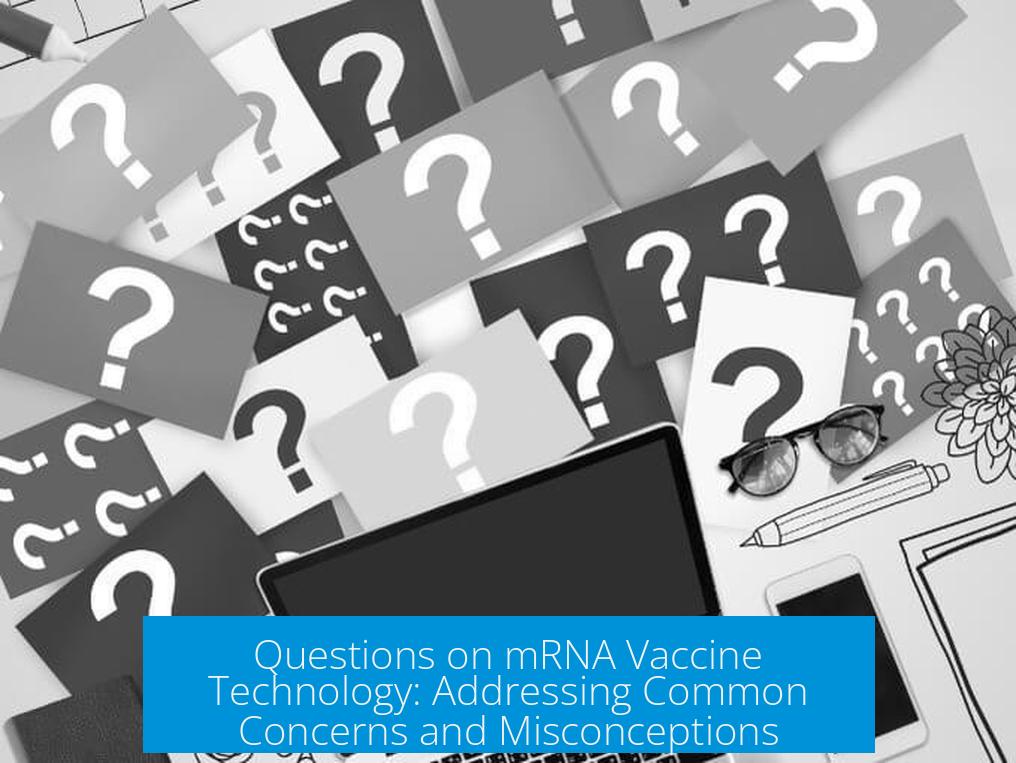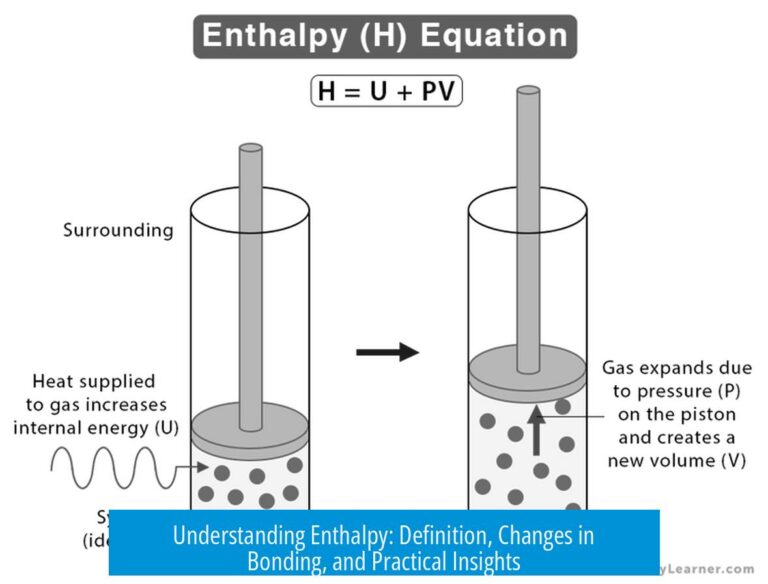Questions on mRNA Vaccine Technology

mRNA vaccines are designed to deliver genetic instructions to cells to produce a viral protein that triggers an immune response without altering human DNA. Concerns about their safety, study validity, and potential genomic integration have been raised and addressed through scientific investigation.
Validity and Relevance of Studies
Some studies evaluating mRNA vaccines face criticism regarding study design and relevance. For example, results derived from experiments on cell lines may not accurately represent effects in living humans. Cell lines used in vitro can differ substantially from human physiology, which limits the direct applicability of such findings.
Hypotheses suggesting that mRNA vaccines might cause cancer are speculative and not supported by evidence. Theoretical concerns posit that injecting mRNA could trigger harmful effects, but a natural viral infection unleashes far more viral mRNA and spike proteins within the body. Thus, vaccines likely reduce cancer risk by preventing viral infections that pose greater threats.
Concerns About Reverse Transcription and Genome Integration
A study proposing that SARS-CoV-2 RNA could be reverse transcribed and integrated into human genomes has faced significant criticism. The scientific community widely disputes these claims, especially regarding mRNA vaccines. The authors of the paper themselves reject the notion that vaccine mRNA integrates into human DNA.
The occurrence of mRNA vaccine sequences integrating into the human genome is considered extremely improbable. While not theoretically impossible, the probability is so low it is irrelevant for practical purposes. mRNA vaccines remain transient, degrading rapidly after protein synthesis without genomic insertion.
Summary of Key Points
- Many studies on mRNA vaccines use models that may not fully reflect human biology.
- There is no credible evidence that mRNA vaccines cause cancer; infection poses a higher risk.
- Claims about SARS-CoV-2 RNA or vaccine mRNA integrating into human DNA lack scientific consensus and are highly unlikely.
- mRNA vaccines function without altering human genomes due to their transient nature.
Questions on mRNA Vaccine Technology: Unpacking the Science Behind the Headlines

Are mRNA vaccines safe? Could they cause cancer? Might they rewrite our DNA? These questions swirl around mRNA vaccine technology like curious bees buzzing a new flower. Let’s dive in and clear the fog, armed with facts and a pinch of humor.
mRNA vaccines took center stage during the COVID-19 pandemic. They brought hope and a new approach to immunization. However, their novelty led to many questions. Questions not just about how they work, but about their safety and long-term effects. Today, we’ll tackle the top concerns and some scientific skepticism head-on.
Are vaccine studies reliable? The quality and design controversy
First, let’s talk about the studies that underpin mRNA vaccines. Are they rock-solid or shaky? Some researchers say the results are “poorly presented and poorly substantiated.” There’s skepticism about the relevance of certain study models, especially when they use cell lines vastly different from human biology. Imagine trusting the cooking advice of someone who’s only microwaved frozen dinners—useful, but not quite gourmet level!
This critique emphasizes that studies done in cell cultures should be interpreted cautiously. Cell lines can behave very differently from live, breathing humans. Results in a petri dish don’t always translate perfectly to the complexity of our bodies.
But the scientific community balances these early studies with later, large-scale clinical trials involving thousands of real people. Those trials gave us reassuring data about how well mRNA vaccines protect against COVID, their side effects, and long-term safety. So while some basic research may seem shaky, the broader pile of evidence is robust and trustworthy.
Could injection of mRNA cause cancer? The spike protein paradox
Here’s a juicy one: Does injecting mRNA cause cancer? Some have hypothesized this might happen. The logic? mRNA in the vaccine instructs cells to make the spike protein of the virus. Could that protein or the injection process itself trigger cancer?
Hold your masquerade ball—the scientists respond with a twist. They argue that if carefully injecting mRNA could possibly cause cancer, then catching the actual virus—where the body is flooded with mRNA and spike protein during infection—would be an even bigger cancer risk. So if anything, getting vaccinated lowers your cancer risk by preventing the massive viral infection.
Think of it this way: Why risk a wildfire when you can have a controlled campfire? There’s a general agreement among experts that vaccines do not cause cancer. It’s an “interesting hypothesis” with almost no evidence backing it.
Will mRNA vaccines change our genome? Busting the reverse transcription myth
Another popular concern is about reverse transcription—the idea that the mRNA in vaccines might convert into DNA and incorporate itself into our genome. Sounds sci-fi, right?
Some studies suggested that SARS-CoV-2, the virus causing COVID-19, might be reverse transcribed into host DNA. That raised alarms for vaccine safety, given the spike protein connection. But these studies were strongly disputed by many experts. Even the authors themselves didn’t claim vaccines cause genomic integration.
If you’re worried about any mRNA vaccine altering your genetic code, here’s the straight talk: While not strictly impossible in a biochemical sense, the odds are astronomically small. Nearly zero. It’s like winning the lottery while being struck by lightning in the same minute.
Our cells have many safeguards that prevent random insertion of foreign RNA into DNA. The mRNA vaccine design is temporary—mRNA quickly degrades inside cells after delivering its message. It never enters the nucleus, the control center where your DNA lives. So permanent genome editing just doesn’t happen.
What does this all mean for you?

Transparency and questions are good. Skepticism fuels scientific progress. But don’t let misinformation or fear steer your health decisions. Here’s a quick checklist for navigating mRNA vaccine concerns:
- Look for studies involving human trials, not just cell cultures.
- Check if hypotheses about harm are supported by widespread scientific consensus or just early, isolated papers.
- Understand biological basics: mRNA is fragile and doesn’t hang around long in your body.
- Remember, natural infection poses bigger risks than well-studied vaccines.
By addressing these questions carefully, we can appreciate the technology’s vast benefits without falling prey to myths or misunderstandings.
Practical tips for vaccine-hesitant friends or family
If you know someone puzzled about mRNA vaccines, try these approaches:
- Share simple analogies: “mRNA is like a recipe card, not a permanent rewrite of your cookbook.”
- Encourage reading from trusted sources like CDC, WHO, or peer-reviewed journals.
- Discuss risks of infection vs. vaccine side effects honestly.
- Point out how mRNA tech has paved the way for other treatments, such as cancer vaccines under development.
We’ve seen a vaccine marvel built in record time. It saved millions of lives globally. No medical technology is perfect, but mRNA vaccines come close to a miracle backed by solid science. Asking questions is essential, but so is trusting the mountains of rigorous research.
So, next time someone asks “Can mRNA vaccines cause cancer? Or rewrite my DNA?” you have a clear answer—and maybe even a little smile ready to ease the worry.
Can mRNA vaccines cause cancer by injecting mRNA into the body?
The idea that mRNA injections cause cancer lacks strong evidence. Even if it were true, a natural viral infection poses a much higher risk. Vaccines likely reduce cancer risk by preventing infection.
Is there a risk that mRNA vaccines integrate into human DNA?
The chance of mRNA vaccines integrating into the human genome is extremely low. Some studies suggested this with COVID, but these were widely disputed. Overall, integration by vaccines is considered irrelevant.
How reliable are studies showing negative effects of mRNA vaccines?
Many studies on mRNA vaccines have design issues and use cell lines not representative of humans. This raises questions about their relevance to real-world effects.
Could mRNA vaccine results in lab tests translate poorly to humans?
Lab results from cells often differ from actual biological responses in humans. Careful study design is essential to produce applicable data.
Why are concerns about mRNA vaccine integration into genome dismissed?
While not impossible, the probability is astronomically small. Scientific consensus holds this risk as negligible and not a public health concern.





Leave a Comment